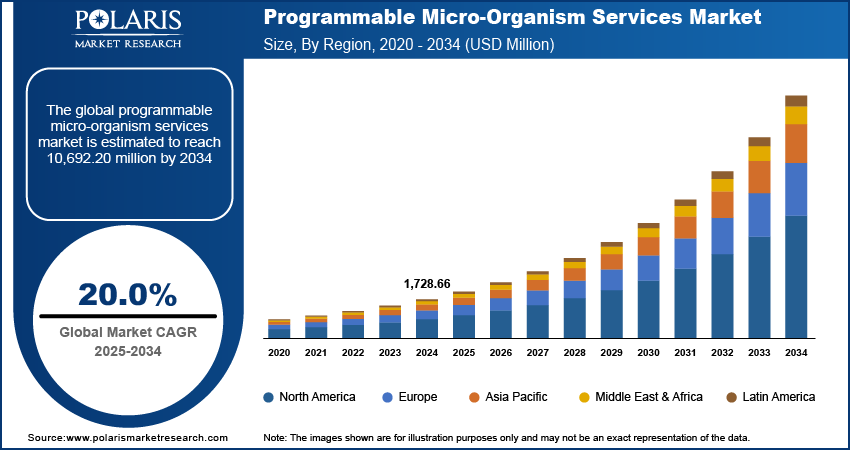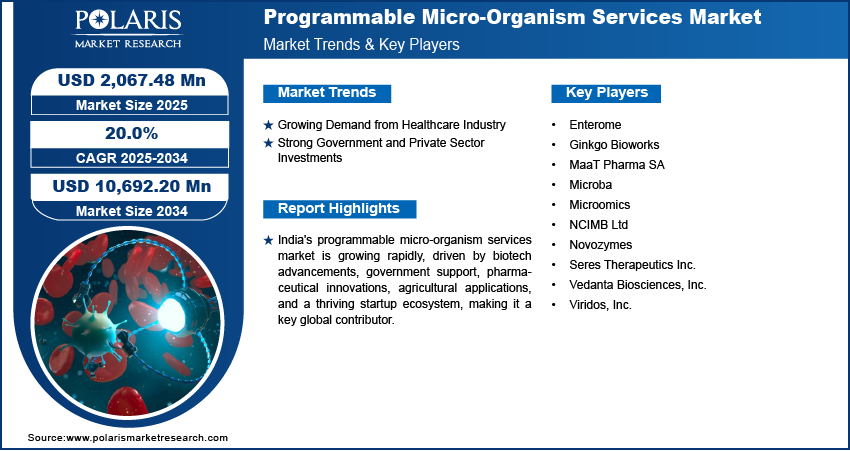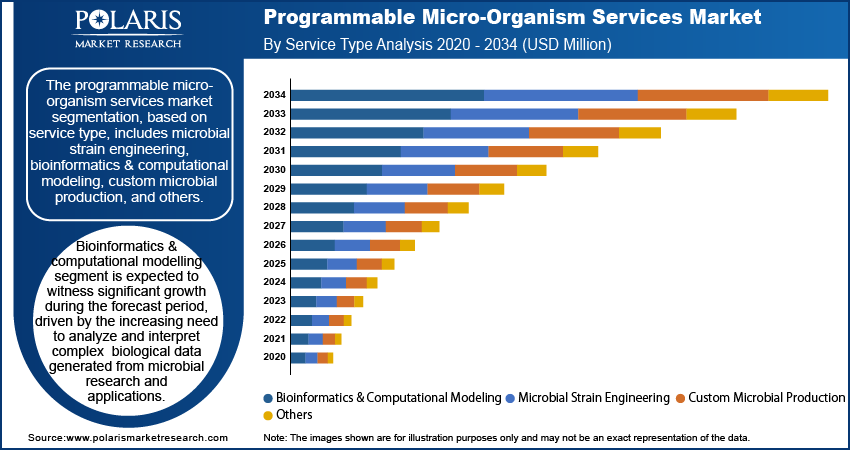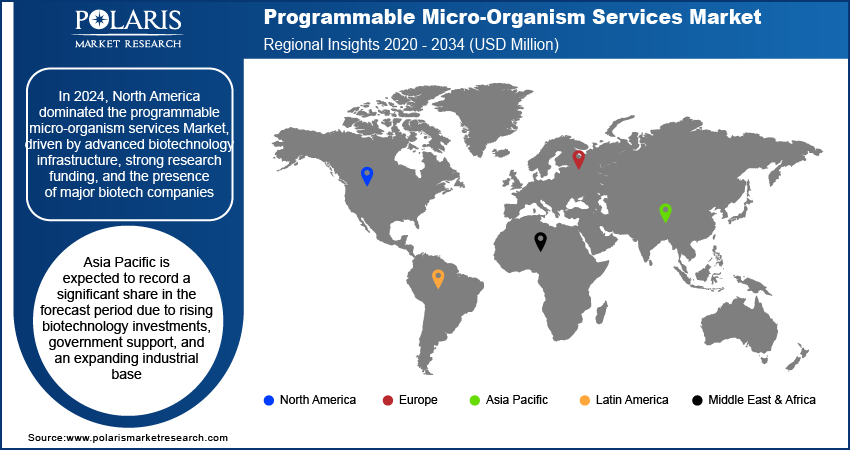
Programmable Micro-Organism Services Market Size, Share, Trends, Industry Analysis Report: By Service Type, Microorganism Type (Bacteria, Yeast & Fungi, Algae, and Others), Technology, Application, and Region (North America, Europe, Asia Pacific, Latin America, and Middle East & Africa) – Market Forecast, 2025–2034
- Published Date:Mar-2025
- Pages: 125
- Format: PDF
- Report ID: PM5469
- Base Year: 2024
- Historical Data: 2020-2023
Programmable Micro-Organism Services Market Overview
Programmable micro-organism services market size was valued at USD 1,728.66 million in 2024. The market is projected to grow from USD 2,067.48 million in 2025 to USD 10,692.20 million by 2034, exhibiting a CAGR of 20.0% during the forecast period.
Programmable micro-organism services involve the genetic engineering and synthetic biology of microorganisms to perform specific tasks, such as producing bio-based chemicals, medicines, or environmental solutions. These services leverage advanced biotechnology to design, modify, and optimize microbes for applications in healthcare, agriculture, energy, and industrial processes.
Rapid progress in synthetic biology and genetic engineering has revolutionized how micro-organisms are modified and programmed. Techniques such as CRISPR and gene editing allow scientists to design microbes that perform specialized functions, such as producing biofuels, synthesizing pharmaceuticals, or breaking down waste. These advancements have significantly reduced the time and cost required for developing custom micro-organisms, making programmable micro-organism services more accessible. As research continues to refine these technologies, more industries are adopting programmable micro-organisms, thereby driving the programmable micro-organism services market growth.

To Understand More About this Research: Request a Free Sample Report
Environmental concerns and the need for sustainable alternatives have increased interest in bio-based solutions powered by engineered micro-organisms. Industries are looking for ways to reduce reliance on fossil fuels, minimize waste, and decrease harmful emissions. Programmable microbes are being used to create biodegradable plastics, clean up oil spills, and improve agricultural efficiency without harming the ecosystem. Governments and companies worldwide are investing in these sustainable technologies to meet carbon neutrality goals and reduce environmental footprints, driving demand for programmable micro-organism services in various applications and thereby driving the growth of the programmable micro-organism services market revenue.
Programmable Micro-Organism Services Market Dynamics
Growing Demand from Healthcare Industry
The healthcare industry is increasingly using programmable micro-organisms for innovative medical solutions. Engineered bacteria and yeast are used to produce life-saving drugs, including insulin, vaccines, and antibiotics. Additionally, microbiome-based therapies are being developed to treat conditions such as gut disorders, infections, and even certain types of cancer. The ability to program microbes for targeted drug delivery and personalized medicine is attracting significant demand from pharmaceutical and biotech companies. The demand for programmable micro-organism services in the healthcare sector continues to grow rapidly as research continues to validate these applications. As a result, the programmable micro-organism services market is experiencing significant expansion.
Strong Government and Private Sector Investments
Governments and private organizations worldwide are investing heavily in synthetic biology and microbial engineering due to their economic and environmental benefits. According to the OECD, in 2023, synthetic biology recorded an investment worth USD 20 billion, showcasing a high volume of investment. Funding for research and development, along with supportive policies, is helping drive innovation in the field. Regulatory frameworks are also evolving to facilitate the commercialization of programmable microbes while ensuring safety and ethical considerations. Private sector investments from biotech firms, venture capitalists, and major corporations are further accelerating the programmable micro-organism services market expansion.

Programmable Micro-Organism Services Market Segment Analysis
Programmable Micro-Organism Services Market Assessment by Service Type
The programmable micro-organism services market segmentation, based on service type, includes microbial strain engineering, bioinformatics & computational modeling, custom microbial production, and others. The bioinformatics & computational modeling segment is expected to witness significant growth during the forecast period. This growth is driven by the increasing need to analyze and interpret complex biological data generated from microbial research and applications. Advancements in sequencing technologies have led to an explosion of genomic data, necessitating advanced bioinformatics tools to manage and derive actionable insights. Computational modeling facilitates the simulation of microbial behaviors and interactions, accelerating the development of engineered micro-organisms for various industrial and medical applications, thereby driving the segmental growth in the market.
Programmable Micro-Organism Services Market Evaluation by Application
The programmable micro-organism services market is segmented by application into healthcare & pharmaceuticals, industrial biotechnology, agriculture & food, environmental applications, and others. The healthcare & pharmaceuticals segment dominated the market in 2024 due to its groundbreaking applications in drug development, disease treatment, and personalized medicine. Engineered micro-organisms are being used to produce essential medicines, such as insulin, antibiotics, and vaccines, making pharmaceutical production more efficient and cost-effective. Additionally, microbiome-based therapies are gaining popularity for treating gut disorders, infections, and even cancer. The rising demand for precision medicine and targeted drug delivery has further accelerated the demand for programmable micro-organisms, thereby leading the segment’s position in the market.

Programmable Micro-Organism Services Market Regional Insights
By region, the study provides the programmable micro-organism services market insights into North America, Europe, Asia Pacific, Latin America, and the Middle East & Africa. In 2024, North America dominated the market driven by advanced biotechnology infrastructure, strong research funding, and the presence of major biotech companies. The US, in particular, is at the forefront due to significant investments in synthetic biology, pharmaceuticals, and bio-manufacturing. Government initiatives, such as funding for genetic engineering research and sustainable bio-based solutions, further fuel growth in demand for programmable micro-organisms.
Asia Pacific is expected to record a significant programmable micro-organism services market share during the forecast period due to rising biotechnology investments, government support, and an expanding industrial base. Countries such as China, Japan, and South Korea are heavily investing in synthetic biology, bioinformatics, and microbial engineering to improve pharmaceutical production, agriculture, and environmental solutions. The region’s growing population and increasing demand for sustainable food production and healthcare solutions are driving the demand for programmable micro-organisms. Additionally, advancements in research capabilities and the establishment of biotech startups are further contributing to the growth of the programmable micro-organism services market.
The programmable micro-organism services market in India is experiencing substantial growth driven by a booming biotechnology sector and increasing government initiatives supporting synthetic biology. The country is becoming a hub for microbial engineering applications, particularly in healthcare, agriculture, and industrial bio-manufacturing. Indian pharmaceutical companies are leveraging engineered microbes for drug development and production, while agricultural advancements focus on biofertilizers and pest control. Additionally, the growing startup ecosystem, along with academic and industry collaborations, is propelling demand for the programmable micro-organism services in India.

Programmable Micro-Organism Services Market Key Players & Competitive Analysis Report
The programmable micro-organism services market opportunity is constantly evolving, with numerous companies striving to innovate and distinguish themselves. Leading global corporations dominate the market by leveraging extensive research and development, and advanced techniques. These companies pursue strategic initiatives such as mergers, acquisitions, partnerships, and collaborations to enhance their product offerings and expand into new markets.
New companies are impacting the industry by introducing innovative products to meet the demand of specific market sectors. According to the programmable micro-organism services market stats, this competitive trend is amplified by continuous progress in product offerings. Major players in the market include Enterome; Ginkgo Bioworks; MaaT Pharma SA; Microba; Microomics; NCIMB Ltd; Novozymes; Seres Therapeutics Inc.; Vedanta Biosciences, Inc.; and Viridos, Inc.
Microomics is a biotechnology company focused on metagenomics and microbiome analysis. Founded in 2017 as a spin-off from the Center for Genomic Regulation (CRG) in Barcelona, Spain, the company uses advanced molecular sequencing technologies and bioinformatics analysis. Microomics provides services across multiple sectors, including pharmaceuticals, health, energy, agri-food, consumer goods, and the environment. Microomics offers a range of products and services tailored to different segments. In health and pharmaceuticals, the company works on detecting lung cancer, analyzing microbiota alterations in airway pathologies, and evaluating pre- and probiotics for obesity treatment. For agriculture and livestock, Microomics assesses prebiotics and probiotics for animal health, characterizes soil fertility, and detects pathogens in crops. In the food industry, the company analyzes food processing chains to improve production and prevent contamination. Microomics also conducts environmental studies, characterizing microbial biodiversity and developing water treatment solutions. It provides customized metagenomics analysis and NGS sequencing services using technologies such as Illumina HiSeq, MiSeq, and Oxford Nanopore. Microomics is based in Barcelona, Spain, and serves both national and international clients. The company has been involved in projects such as the microbial characterization of the Pacific coast in North America. Microomics is located within the Barcelona Biomedical Research Park (PRBB), which facilitates collaborations with research institutions and industry partners.
NCIMB Ltd, established in 1982 and headquartered in Aberdeen, Scotland, is a biotechnology company that specializes in microbiology, analytical services, and biological material storage. It operates as a private limited company with a focus on research and experimental development in natural sciences and engineering. NCIMB manages the UK’s largest public repository of bacterial strains, known as the National Collection of Industrial, Food, and Marine Bacteria (NCIMB), which supports research and biotechnology applications across various industries. The company provides a range of services and products, including a culture collection that supplies bacterial strains for research and commercial use, microbiology services such as microbial identification and genome sequencing, and secure storage solutions for biological materials, including patent deposits. Additionally, NCIMB offers quality control products and specialist media for energy and environmental applications and conducts ecotoxicity testing using MARA and LumiMARA systems for environmental safety. NCIMB operates from its laboratories in Aberdeen but serves clients globally. Its customer base includes pharmaceutical companies, food and beverage producers, energy firms, universities, and research institutions. The company ships bacterial strains worldwide to support research and development efforts. NCIMB is certified to ISO 9001:2015 standards with GMP-compliant services, indicating adherence to quality management standards.
Key Companies in Programmable Micro-Organism Services Market
- Enterome
- Ginkgo Bioworks
- MaaT Pharma SA
- Microba
- Microomics
- NCIMB Ltd
- Novozymes
- Seres Therapeutics Inc.
- Vedanta Biosciences, Inc.
- Viridos, Inc.
Programmable Micro-Organism Services Market Segmentation
By Service Type Outlook (Revenue USD Million, 2020–2034)
- Microbial Strain Engineering
- Bioinformatics & Computational Modeling
- Custom Microbial Production
- Others
By Microorganism Type Outlook (Revenue USD Million, 2020–2034)
- Bacteria
- Yeast & Fungi
- Algae
- Others
By Technology Outlook (Revenue USD Million, 2020–2034)
- Gene Editing & CRISPR
- AI & Bioinformatics
- Metabolic Engineering
- Others
By Application Outlook (Revenue USD Million, 2020–2034)
- Healthcare & Pharmaceuticals
- Industrial Biotechnology
- Agriculture & Food
- Environmental Applications
- Others
By Regional Outlook (Revenue USD Million, 2020–2034)
- North America
- US
- Canada
- Europe
- Germany
- France
- UK
- Italy
- Spain
- Netherlands
- Russia
- Rest of Europe
- Asia Pacific
- China
- Japan
- India
- Malaysia
- South Korea
- Indonesia
- Australia
- Rest of Asia Pacific
- Middle East & Africa
- Saudi Arabia
- UAE
- Israel
- South Africa
- Rest of Middle East & Africa
- Latin America
- Mexico
- Brazil
- Argentina
- Rest of Latin America
Programmable Micro-Organism Services Market Report Scope
|
Report Attributes |
Details |
|
Market Size Value in 2024 |
USD 1,728.66 million |
|
Market Size Value in 2025 |
USD 2,067.48 million |
|
Revenue Forecast in 2034 |
USD 10,692.20 million |
|
CAGR |
20.0% from 2025–2034 |
|
Base Year |
2024 |
|
Historical Data |
2020–2023 |
|
Forecast Period |
2025–2034 |
|
Quantitative Units |
Revenue in USD million and CAGR from 2025 to 2034 |
|
Report Coverage |
Revenue Forecast, Market Competitive Landscape, Growth Factors, and Industry Trends |
|
Segments Covered |
|
|
Regional Scope |
|
|
Competitive Landscape |
|
|
Report Format |
|
|
Customization |
Report customization as per your requirements with respect to countries, regions, and segmentation. |
FAQ's
The programmable micro-organism services market size was valued at USD 1,728.66 million in 2024 and is projected to grow to USD 10,692.20 million by 2034.
The global market is projected to register a CAGR of 20.0% during the forecast period, 2025-2034.
North America had the largest share of the global market in 2024.
The key players in the market are Enterome; Ginkgo Bioworks; MaaT Pharma SA; Microba; Microomics; NCIMB Ltd; Novozymes; Seres Therapeutics Inc.; Vedanta Biosciences, Inc.; and Viridos, Inc.
The healthcare & pharmaceutical segment dominated the programmable micro-organism services market in 2024 due to its groundbreaking applications in drug development, disease treatment, and personalized medicine.
The bioinformatics & computational modelling segment is expected to witness significant growth during the forecast period, driven by the increasing need to analyze and interpret complex biological data generated from microbial research and applications.
